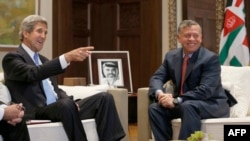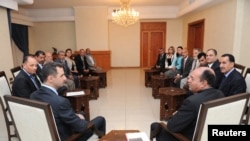AMMAN —
U.S. Secretary of State John Kerry says Syrian President Bashar al-Assad risks increasing international support for his opponents if he does not agree to take part in peace talks. In Amman, Kerry criticized Iran for "making the problem worse" in Syria.
Kerry says governments backing the opposition in Syria condemn what he calls the destructive role of Lebanese Hezbollah militants fighting alongside government troops.
"Active military support to the Assad regime simply exacerbates the sectarian tensions and perpetuates the regime's campaign of terror against its own people," said Kerry.
Kerry says Iran is "contributing significantly to this violence" by actively supporting thousands of Hezbollah fighters.
While he says President Barack Obama does not intend to send U.S. troops to Syria, he has taken no options off the table with respect to what kind of support Washington might provide the opposition.
Kerry says the Obama administration hopes President Assad "will understand the meaning of that, and the Iranians and others will understand the meaning of that" as well. But he coupled the threat of greater rebel support with an appeal to join talks on a transitional government.
"The benefit of a political settlement is in everybody's interest. And I think that's true for Lebanon and that's true for Iran. And hopefully Iranians could find themselves even finding a way to be contributing somehow to a solution rather than making the problem worse," he said.
Speaking to reporters alongside Jordanian Foreign Minister Nasser Judeh, Kerry said he is not here to dictate to anyone about peace talks but rather to find the best way forward.
"We will listen to all voices with respect to the format, to the timing, to the agenda, and to the outcomes to be discussed," he said.
But he says the already-agreed-to mutual-consent provisions of a transitional government make clear that President Assad has no future ruling Syria.
"Can a person who has used artillery shells and missiles and Scuds and tanks against women and children and university students - can that person possibly by judged by any reasonable person to have the credibility and legitimacy to lead that country in the future?" asked Kerry.
So why would President Assad join such peace talks? If it is because he believes recent military advances put him in a stronger position, Kerry says the Syrian leader is mistaken.
"If Bashar al-Assad thinks the gains he has made in the last few days are going to be determinative of this, then he is miscalculating just as he did when he engaged in this struggle against his own people," he said.
Assad troops and Hezbollah fighters have gained ground along the Lebanese border, which Foreign Minister Judeh says risks fragmenting Syria.
"The presence of extremist organizations and non-Syrian fighters on the ground is of concern to many of us - those countries that are neighboring Syria and those countries that are interested in preserving the territorial integrity and the safety and security of the Syrian people," said Judeh.
Judeh and Kerry joined foreign ministers from Britain, Egypt, France, Germany, Italy, Qatar, Saudi Arabia, Turkey, and the United Arab Emirates in discussing the U.S.-Russian plan to bring together for the first time rebel and government representatives.
Latest images from Syria
Kerry says governments backing the opposition in Syria condemn what he calls the destructive role of Lebanese Hezbollah militants fighting alongside government troops.
"Active military support to the Assad regime simply exacerbates the sectarian tensions and perpetuates the regime's campaign of terror against its own people," said Kerry.
Kerry says Iran is "contributing significantly to this violence" by actively supporting thousands of Hezbollah fighters.
While he says President Barack Obama does not intend to send U.S. troops to Syria, he has taken no options off the table with respect to what kind of support Washington might provide the opposition.
Kerry says the Obama administration hopes President Assad "will understand the meaning of that, and the Iranians and others will understand the meaning of that" as well. But he coupled the threat of greater rebel support with an appeal to join talks on a transitional government.
"The benefit of a political settlement is in everybody's interest. And I think that's true for Lebanon and that's true for Iran. And hopefully Iranians could find themselves even finding a way to be contributing somehow to a solution rather than making the problem worse," he said.
Speaking to reporters alongside Jordanian Foreign Minister Nasser Judeh, Kerry said he is not here to dictate to anyone about peace talks but rather to find the best way forward.
"We will listen to all voices with respect to the format, to the timing, to the agenda, and to the outcomes to be discussed," he said.
But he says the already-agreed-to mutual-consent provisions of a transitional government make clear that President Assad has no future ruling Syria.
"Can a person who has used artillery shells and missiles and Scuds and tanks against women and children and university students - can that person possibly by judged by any reasonable person to have the credibility and legitimacy to lead that country in the future?" asked Kerry.
So why would President Assad join such peace talks? If it is because he believes recent military advances put him in a stronger position, Kerry says the Syrian leader is mistaken.
"If Bashar al-Assad thinks the gains he has made in the last few days are going to be determinative of this, then he is miscalculating just as he did when he engaged in this struggle against his own people," he said.
Assad troops and Hezbollah fighters have gained ground along the Lebanese border, which Foreign Minister Judeh says risks fragmenting Syria.
"The presence of extremist organizations and non-Syrian fighters on the ground is of concern to many of us - those countries that are neighboring Syria and those countries that are interested in preserving the territorial integrity and the safety and security of the Syrian people," said Judeh.
Judeh and Kerry joined foreign ministers from Britain, Egypt, France, Germany, Italy, Qatar, Saudi Arabia, Turkey, and the United Arab Emirates in discussing the U.S.-Russian plan to bring together for the first time rebel and government representatives.
Latest images from Syria











